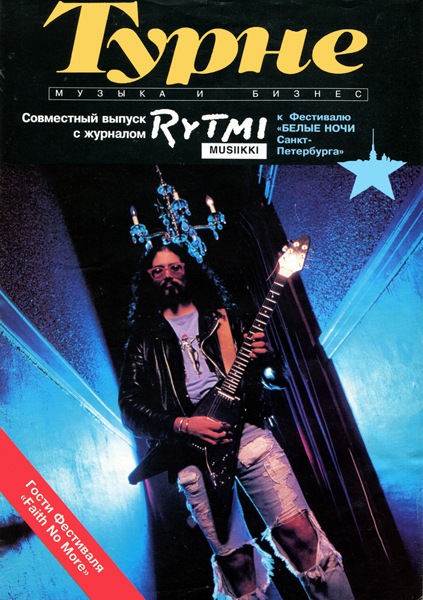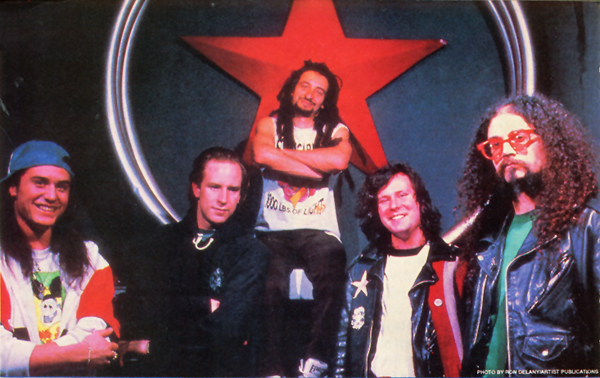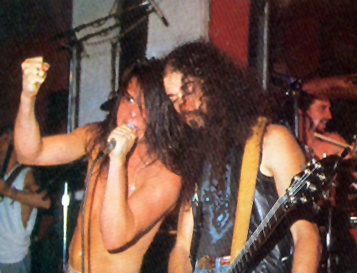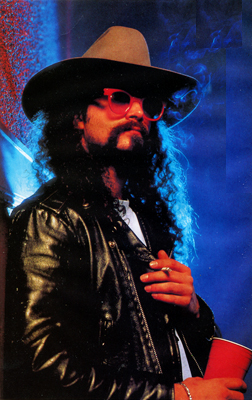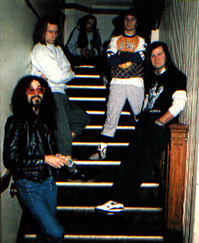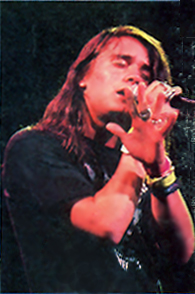
| Search JoyZine with Google Site Search! |
|
Faith No More interview by Joy Williams
Sound check was over and we had a few hours to kill before the show at midnight, so guitarist Jim Martin piled us into his pickup and we headed out to see a movie—his choice, of course. Along the way, Jim was amusing himself by seeing how close he could get to things without actually hitting them, while simultaneously screaming at people on street corners and watching them react (or perhaps to accompany the radio that didn't receive music, just very loud screeching). His girlfriend Nancy was just sort of sitting there quietly, as usual. And I was trying hard to convince myself that if my time had come (to die), there wasn't anything I could do about it just now, so I might as well relax. Of course, my knuckles were quite white as I braced myself against the dashboard.... Jim's sucking on his hand. "Fuck!" "What's wrong?" I wonder. "I'm bleeding between my fingers." Huh? "What, you just bleed spontaneously?" "Yeah," he confirms, "if I eat certain things. There must've been something in that pizza we had. But it's usually from my head." Oh. "Can I print that?" "You can print anything I say." OK, dude.... I get a funny feeling as we pull into the movie house parking lot. "Uh, am I going to have to hide my eyes a lot in this movie?" I wonder. "Nah," comes the assurance. Yeah, well, the movie turns out to be Parents, about a kid whose parents are cannibals. Even Sandy Dennis (the school psychologist that the wigged-out kid had been sent to), gets eaten. "So, Jim," I wonder, "why did you choose to bring us to this particular movie?" "Because I thought my friends should see it," he smiles. I've known the band since '85, and have been a fan from the beginning. They were so different from anything I'd every heard before, but I was convinced that they were going to be the forerunners of a new sound that was just about to happen in rock. So I hung around and waited through all the times when everyone, even their management, was telling me I was crazy. Then, they released The Real Thing, and the rest of the world's rock press went nuts, calling them The Greatest Band of the Year. Even Axl Rose was quoted as saying, "I have seen the future of rock'n'roll, and it is Faith No More." They're rude and crude and can really give you a hard time if they feel like it. But their music is so interesting. Besides, underneath it all, these guys—original members bassist Bill Gould, drummer Mike Bordin and keyboardist Roddy Bottum, together now with guitarist Jim Martin and singer Mike Patton—can be real cool, too. But their audiences are utterly wild, consisting largely of young, frustrated, angry white males who co-opted punk's stage diving while adding "moshing." "So, when do you want to do this interview?" Jim was on the phone, finally. We meet at a pool hall in Hayward. At first, he's ... well, Jim Martin: Not too overtly cooperative. I have to pay my dues first, hang around a while, but finally we settle down to business in a small bar down the street. Not that that makes him any the less argumentative. It was great fun, and lasted for hours. Following, the gist of the conversation:
Q: I read an article once about the difficulties Hollywood has in casting musicians. They're such an odd and distinctive personality type that it's almost impossible to fina an actor or actress who can portray a musician convincingly. JIM: You ever figure musicians are just trying to raise their kids and pay their rent just like everybody else? I know a lot of people who aren't musicians at all but who are pretty strange. As a matter of fact, just about everyone I've ever met has been very "different." Most people are musicians. Most people can make music. But, why would anyone bother? What makes a musician a musician? Q: But there's a vast difference between creative and non-creative people... JIM: You're saying musicians share a similarity? Q: Yes. JIM: Well, I'm saying otherwise. Where we're having a difference is that I don't believe there are non-creative people. It could also be that creative people haven't been taught, and that makes them creative. It's just what people have time for. I think people who get their hair colored are being creative. Maybe in order to be considered creative you have to be determined to be creative. Q: Do you think that, if you teach someone a few chords, they could become a creative musician? JIM: Absolutely. It's just a set of rules; you don't have to understand it to be able to do it. If you just follow the rules, you can do it. Q: Well, some people can come up with a new idea, something no one else has ever thought of. Some people can only do that once—they have one good idea and they keep that sound or image forever Other people change a lot, like Bowie. JIM: He's a whole different fuckin' can of worms, that guy is. I don't consider him to be a musician; he's an entertainer. Q: Some people, like Bowie, are very influential on others.... JIM: I think there's a chemistry between people. Like the Rolling Stones—any one of them on their own wouldn't have done as well. Led Zeppelin's like that, too. Together, they were something way huger than any one of them alone could ever be.
Q: I've noticed that with your new lead singer, there's a chemistry now.... JIM: The chemistry was there between the rest of us, but not with the singer. Q: ...and it's affected your sound. You're different than you were with Chuck (the old singer they fired after Jim wound up having to play the entire English tour with a broken hand—due to an altercation with Chuck). JIM: The band is pretty much the same, it just came out sounding different because we have a different singer. Q: Look, I want to know why you sound so different, and you're resisting even acknowledging it. JIM: It's just the way I sound, what can I say? It keeps changing, too. Q: That's right! You feed off yourself.... JIM: I feed off other people a lot. Q: But you don't copy others. JIM: Yeah, I copied a lot of people. Q: OK. New question: You told me earlier that you're a professional musician because you want to make a good living. But, if all you wanted out of music was to make money, you would write another pop metal power ballad.... JIM: No way! Why would I do that? I don't like that shit. I don't think I could make money doing that, because I don't like it. I don't think I could pull it off. Q: Can you only pull off what you like? JIM: Yeah, yeah. That's all anybody can do, unless they're extremely talented. This is where talent comes in. People who are extremely talented can pull off things they don't like and be successful at it. That's a key factor. (pause) I think we've hit on a profound truth here! Q: Any examples? JIM: Possibly David Bowie. I like playing by myself as well. I love music. It makes me feel fine, makes me feel pissed off, makes me feel happy, makes me want to drink, makes me want to vomit. Q: Why do you like vomiting so much? JIM: I don't really like it. I like seeing people watch somebody else vomit. Q: Oh, you just like to get reactions. JIM: That's probably true. [He pauses to look around at the little neighborhood bar filled with the usual assortment of patrons, drinking, talking, laughing and playing a steady stream of past and present hit songs on the jebox.] Like the people in this bar, listening to the jebox. The drunker they get, the more into it they get. Q: That's because alcohol shuts off the thinking side. JIM: That's kind of like what music does, as well. It kind of shuts out some of the thinking side. Once a song is done, there's no creativity left for it. Once a song is recorded on vinyl or tape or in the jebox, any time it's playing, it's the same thing. Q: Do you like to practice? JIM: Not really. I like to play stuff, though. I like to figure out songs. I don't like to rehearse. Q: Do you like the challenge of figuring it out? JIM: Yeah, it's a lot of fun. Like painting a picture. You like to paint it, right? Did you ever start off a picture and not know what it's going to be? Q: Actually, most of the time. JIM: But when you finish, it's something. Then you can change it, and make it more like that if you want to. Q: Yeah, you can also ruin it. JIM: You might ruin it, but someone else would say, "Oh, that's fuckin' great." Q: Do you care whether other people feel what you have created is good? JIM: I care whether I feel it's good or not. I'm fully aware that I can do something that I think is shitty, but other people can say that it's great. Q: How does that make you feel? JIM: I laugh. Because I know it's fuckin' shitty. Q: Some people get very depressed when that happens, and alienated. JIM: Why? That's pretty stupid. They must be high on drugs. Q: What's your thing with "drugs?" JIM: It's a huge tool. Q: A tool for...? JIM: For lots of things. Say you're in pain. You take drugs to take the pain away.
Q: You can become a junkie like that, and create nothing. JIM: Well, you see, people who are doing that are not taking away physical pain, they're trying to take away the pain of their mind. Drugs can't do that for any length of time. Q: Can music? JIM: For some people. Q: For you? JIM: Sometimes. It's a joyous thing for me, to create a song. I mean, if it ends up working out the way I thought it would. Q: Exciting? JIM: Very exciting. Gratifying. Although there are some songs I've been working on for years and haven't been able to figure out. Q: How do you go about creating a song? JIM: I don't know. Usually, I go and jam with someone, make a tape. And you listen to it later and go, "Oh, fuck, that was a cool thing!" Maybe there were two seconds of something good in it... But you think about that for a while and some day, eventually, you're sittin' around somewhere, maybe shooting pool, and all of a sudden you realize that bit would sound good with this other bit you just thought of... Q: And that doesn't have anything to do with rules, does it? JIM: There are no rules. Things are the way they are, no matter what anybody says. Q: Are you out to make a name for yourself.... JIM: When you try really hard to do something, you usually fuck up. People who try to impress other people are usually considered to be dicks. That would be pretty much flattering myself, wouldn't it, to say that shit about myself? I'd be putting myself above everybody else, wouldn't I? Q: When it comes down to your own music, though, you have to go by your own opinion, don't you? And yet, the whole process of becoming a professional musician requires you to put yourself out there, to be judged. How do you deal with other people's judgments? JIM: Well, a lot of people are scared of it and all that. But when you like something, it's no big deal. Some of the best things in life are hard. It's like discovering something, you know? Q: OK. Let's talk about your influences. JIM: Black Sabbath, my Mom, by Dad, my football coach in high school. Q: What did he have to do with music? JIM: He taught me perseverance. He showed me how far I could actually go. When I thought I couldn't go any farther, he showed me I actually could. Q: Did you spend lots and lots of hours locked in your room, practicing? JIM: Yeah. I was fascinated by it. By what could be done. Just by music in general. I was fascinated that it could make me feel the way that it could. Q: And what did you listen to as a kid? JIM: I listened to Aerosmith, Toys In The Attic, fine record. I listened to Jimi Hendrix, Black Sabbath, Lynyrd Skynyrd, Thin Lizzy, Velvet Underground, early Scorpions and UFO, Michael Schenker and Uli Jon Roth. A lot of shit, I just twisted it all up. Q: Did you ever say to yourself, "I want to be Jimi Hendrix?" JIM: Uh-uh. But, I would learn some songs and I would figure, "All right, if I could only learn how to play this, then I would be fuckin' real bad." Right? So I learned how to play it, and I realized nothing really happened to me. You see, I learned something since I was a little kid. It doesn't really matter. It doesn't matter what you think or what anybody says, things are the way they are anyway. Q: How do you typically work out a song?
JIM: It works best if we give each other tapes, but it's different every time. A lot of times, I'll start off with a song and I'll have no idea how it's going to turn out. There's one song on this LP, "Epic," that they had all worked out, pretty much, and I didn't know what the fuck I was going to do with it. So we were having practice and I said, "OK, just play it, I'm just going to jam." And that's how I figured out what to play; it just came to me. I just played it! Q: Do you know why you like "harder" music? JIM: Yeah, I like the way it sounds. I like melody too, but I can be excited just by a single sound. We should go across the street. It was 1:30 in the morning (I had said I'd hang in there if it took all night), and I found myself crossing the street from a funky bar to an all-night diner. I figured it wouldn't last much longer, though, and I sure could use a cup of coffee after the Scotch I'd consumed; I had a long drive ahead of me. Still, it was getting harder to be so aggressive. After we settled in, I was sort of rambling on about how his East Bay subculture was so different from Silicon Valley. It was like family, or clan, or… JIM: You know what happened to the Roman empire? Things got too easy and they all turned pretty measly. That's the way things are going for us now—most of the world, the Western world. America, mostly. Things are too easy, and people are getting fucking stand-offish. They're selfish; people are less prone to commitment and so forth. But, you know, a good catastrophe or war or something could change all that around. A lot of people are afraid to stick to any one person, afraid to have kids.... Q: What are they afraid of? JIM: Being tied down. What it really comes down to is, they're afraid of being tied down to their own measly fuckin' shit. People are developing a lot of problems, a lot of people are killing themselves. A lot of people are getting addicted to drugs; they've got nothing better to do. After a big, catastrophic event people would be looking for things to cling to, mostly other people. I think that would help out a lot. I think Los Angeles needs a big earthquake, so they can start over.(as he orders a Belgian waffle with strawberries) Q: Is this modern-day alienation why some people form their own "clans?" JIM: I think that's a real good thing. People should stick together. How many close friends do people have? Maybe that's why people are clannish. Maybe you're seeing their close friends. And there are degrees of closeness.... You can figure that you have a lot of friends, but how many friends do you really think that you have, actually? I think I have about three friends. I don't have to talk to them. Like, I might not see 'em for an extended period of time, a year or more, then I go see 'em and it's the same as if (it was] the next day. There are a lot of people who are friendly—but then if you can't do something for them, all of a sudden you're an asshole.
Q: Do you like to think? JIM: Not really. I try not to. It gets in the way of trying to do stuff. It gets in the way of being a rational person. Because you get fed up with thinking about fucking shit. I'd rather be doing something else. You see, if you're busy thinking about a bunch of crap, you're liable to miss out. You might let something real good slip by.... Well, now what? Q: ["Right," I think, "now what.... I'm really tired and exasperated at this point. I glare at him.] Umm, do you think rock'n'roll will save the world? JIM: No. It will help it crumble. Q: And you want to help? JIM: Absolutely. It will be all for the better, I guess. JIM: Well, you'll eventually run out of drugs to try. Q: Undoubtedly. Unless they invent some more. JIM: So all that's left for you to try is murder. Q: No. I don't think I'll do that. JIM: Are you anti murder? Q: Well, I don't think it's a very good thing for society in general. JIM: You don't think so? Are you pro murder? Q: No. JIM: Think about the wolves. You keep the herd strong by killing off the old and sick. Now, the murderers help us out. Q: Are you pro murder? JIM: Absolutely. I think it's a necessary part of society. I mean, where would we be without murderers? Q: Uh, I don't know.... JIM: That's right. It's very frightening, the unknown. Weren't you ever afraid of the dark? Q: No, I like the dark. Night time is magic time. JIM: A time of monsters. Q: No. Magic. Elves and fairies. JIM: Murderers. Q: No, I never thought of it like that. At least not until I got older and started reading the newspaper. Even now, how could I park in some dreadful neighborhood and walk alone for several blocks to some venue, if I was afraid of the dark? JIM: You could be murdered, whether you're afraid of it or not. That's not important. Q: I'm well aware of that, but I could be murdered in broad daylight. JIM: Are you aware of how you might be murdered? Q: No. Well, I could think of possibilities.... But I've often been in a very dangerous situation, and I've always managed to get out of it. JIM: How? Q: I don't know, really. I just adopt an attitude that I won't be touched, that I'm completely unafraid. They say that you're much more likely to be attacked if you appear to be weak-willed or frightened. But, I really don't want to think about it, because if I do, I might become frightened. Is this something you think about much? JIM: Yeah. Q: Why? JIM: I don't know. I've just been thinking about it a lot lately. Q: You want to murder somebody? Or is it just a fascinating subject? JIM: I don't know. (sounds puzzled) Q: Anything trigger it? JIM: Yeah. Well, actually, something did trigger it. I was in Hollywood and we were recording this record. I tried to talk to these girls, they were driving in their car and I was driving in mine, and I was trying to talk to them. And they wouldn't pay any attention! And they got scared and told the police, who arrested us and threw us in jail—me and two other guys. And I thought to myself, "Shit, man, what's this world coming to, when you can't even talk to girls without getting thrown in jail?" So, I guess I can't talk to 'em anymore, except to murder 'em. I can get away with it, probably, easier. Q: Think you'd want to? JIM: In Hollywood? I think I could get away with murder a lot easier than just trying to fucking be nice! Q: But do you think you'd actually want to murder someone? JIM: I don't know. I haven't murdered anybody yet. I don't think I'd get any big kick out of it or anything. Q: Are you pro nuclear weapons? That's murder on a mass scale. JIM: As far as I'm concerned, nuclear weapons don't exist. Nuclear weapons were used only twice, at the end of World War II. It was a real ugly thing. I don't think anybody wants to see that again. It was an atrocity. A very powerful statement. I think that nuclear weapons are pretty much just a threat. Just something for people to worry about, and what governments use to make people be worried. Q: Ummm, what else do I have to say? JIM: That's all right. Say something else. (He looks at me closely.) What's your religion? Q: Oh, well, I was Christened in the Church of England.... JIM: I was sitting in a bar in England and a girl walked up to me and said, "We druids have to stick together!" Now, when people ask me if I'm a Christian, that's what I tell 'em. I'm a druid. A druid," I think. "Sacrificial maidens...." "C'mon," he says, "it's almost 3:30. It's dark outside. I'll walk you back to your car." Every person who is hooked on drugs needs help. To get that much-needed drug addiction support, the friends or family of a drug addict need to intervene and work to find the best rehabilitation and treatment services available for their loved one. They have to take action before it’s too late. Backstage with Faith No More |
